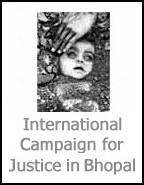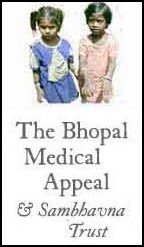| Vintage High School, California |
Bhopal Teach-in
On May 13th Vintage High School hosted its second annual Greenfest.
Students from the Amnesty International student group donned hazmat
suits, blue surgical gloves, face masks and ribbons of caution tape
to demonstrate their concern for the community of Bhopal, India.
They carried signs that read: We Are All Bhopal; Corporate Accountability
is Not an Oxymoron; Justice for Bhopal; Defend Those Who Give the
Earth a Voice.
The library is co-hosting a photo exhibition by Raghu Rai, India's
most distinguished print photographer. The black-and-white images
he took on December 3, 1984 the morning after the devastating gas
leak, document the horror. In addition, his images from the 2002
work commissioned by Greenpeace record the continuing tragedy. The
library exhibit is highlighted with yellow and black caution tape
and flames of many colors hanging above the entrance with the words
of Rashida Bee, gas survivor and 2004 Goldman Environmental Prize
winner: "We are not expendable. We are not flowers offered
at the altar of profit and power. We are dancing flames committed
to conquering darkness and to challenging those who threaten the
planet and the magic and mystery of life." Resources were made
available for teachers and their classes who visited the exhibition.
Some initial comments from students:
- "How would the Trans National Corporation board members
like it if the chemical spill was in their neighborhood? How would
they like it if their children went homeless and without medical
care?"
- "I thought the photos were unforgettable. I've never seen
anything like this. And it's still going on. Will we forget about
the Tsunami victims and survivors this easily?"
- "It's time to take some initiative. Do these corporations
control the world even more so than governments?"
- "Rusted containers, chemicals on the ground leaking toward
wells, endless suffering. This has been going on my entire life.
Why am I just hearing about it now?"
- "When our class was putting up the photos, I didn't want
to look at them, so I started to distract myself. But, I saw them
anyway and now when I go in the library I find myself pulled in
their direction. Very strong."
- "Sometimes saying nothing says it all."
- "We get told a lot of stuff in school, but not the important
stuff like this. And I'm 18 years old right now and about to graduate
and no one has mentioned Bhopal, India until the teach-in. What
else haven't I been told?"
The Vintage High School Amnesty International group and the Poetry
Club partnered with the Corporate Action Network and Students for
Bhopal to present our 30th human rights teach-in on May 16, 2005.
Our theme was We Are All Bhopal, a reference to the December 1984
chemical leak that is known as the "Hiroshima of the chemical
industry." It claimed 20,000 lives and compromised the health
of a half-million people. The Bhopal case invites an examination
of globalization - an expanding worldwide integration of systems
of production, trade, investment, and labor - and the myriad of
human rights challenges, not the least of which is accountability.
As the language of the title "We Are Bhopal" suggests,
the teach-in emphasized the interconnectedness of business practices
within the U.S. with those of transnational corporations (TNCs).
The agenda included viewing One Night in Bhopal by Steven
Condie and the BBC followed by a readers' theater production entitled,
"And the Witnesses Rose - and Spoke" which is constructed
from stories of survivors, corporate press releases, media reports,
scientific studies that I edited together from source material collected
by Students for Bhopal. The San Francisco Bay Area Youth Speaks
poets performed their award-winning work and conducted a writing
workshop on themes related to corporate accountability, environmental
racism, the rights of the child. Participants had several opportunities
to take action on behalf of the survivors of the Bhopal disaster
as well as to strategize ways to engage in social activism on behalf
of communities like Midland, Michigan and Martinez, California where
the environment and human rights are intersecting and synergistic
issues.
Although the Bhopal tragedy made the cover of Time magazine
in 1984, many people do not remember it because in the intervening
years it was not fully covered in corporate media. Panelists Julianne
Cartwright Traylor (Human Rights Advocates, AI-USA), Peter Phillips
(Project Censored), Elizabeth Hawkins (former chemical industry
quality control officer), and Ted Migdal (high school environmental
science teacher) discussed the Bhopal case from several perspectives:
scientific, environmental, humanitarian, cultural, economic. Several
critical questions shaped the discussion. Among them:
- What does environmental justice mean when the rules are made
in an unequal power structure?
- How do we hold corporations accountable for a comprehensive, transparent,
and verifiable human rights policy with an explicit commitment to
uphold the UDHR?
- What are the responsibilities of the parent company for subcontractors,
suppliers, and partners?
- What role do TNCs play in providing direct or indirect benefits
to corrupt governments?
- How do we defend the defenders?
- top -
|
 IN
BHOPAL
IN
BHOPAL



